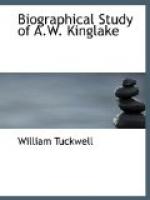If the framework of the narrative is epic, its treatment is frequently dramatic. The “Usage of Europe” in the opening pages is not so much a record as a personification of unwritten Law: the Great Eltchi tramps the stage with a majesty sometimes bordering on fustian. Dramatic is the story of the sleeping Cabinet. “It was evening—a summer evening”—one thinks of a world-famous passage in the “De Corona”—when the Duke of Newcastle carried to Richmond Lodge the fateful despatch committing England to the war. “Before the reading of the Paper had long continued, all the members of the Cabinet except a small minority were overcome with sleep”; the few who remained awake were in a quiet, assenting frame of mind, and the despatch “received from the Cabinet the kind of approval which is awarded to an unobjectionable Sermon.” Not less dramatic is Nolan’s death; the unearthly shriek of the slain corpse erect in saddle with sword arm high in air, as the dead horseman rode still seated through the 13th Light Dragoons; the “Minden Yell” of the 20th driving down upon the Iakoutsk battalion; the sustained and scathing satire on the Notre Dame Te Deum for the Boulevard massacre. A simple dialogue, a commonplace necessary act, is staged sometimes for effect. “Then Lord Stratford apprised the Sultan that he had a private communication to make to him. The pale Sultan listened.” . . . “Whose was the mind which had freshly come to bear upon this part of the fight? Sir Colin Campbell was sitting in his saddle, the veteran was watching his time.” . . . “The Emperor Nicholas was alone in his accustomed writing-room. He took no counsel; he rang a bell. Presently an officer of his staff stood before him. To him he gave his order for the occupation of the Principalities.” This overpasses drama—it is melodrama.
To the personal element which pervades the volumes great part of their charm is due. The writer never obtrudes himself, but leaves his presence to be discerned by the touches which attest an eye-witness. Through his observant nearness we watch the Chief’s demeanour and hear his words; see him “turn scarlet with shame and anger” when the brutal Zouaves carry outrage into the friendly Crimean village, witness his personal succour of the wounded Russian after Inkerman, hear his arch acceptance of the French courtesy, so careful always to yield the post of danger to the English; his “Go quietly” to the excited aide-de-camp; {17} his good-humoured reception of the scared and breathless messenger from D’Aurelle’s brigade; the “five words” spoken to Airey commanding the long delayed advance across the Alma; the “tranquil low voice” which gave the order rescuing the staff from its unforeseen encounter with the Russian rear. He records Codrington’s leap on his grey Arab into the breast-work of the Great Redoubt; Lacy Yea’s passionate energy in forcing his clustered regiment to open out; Miller’s stentorian “Rally” in reforming the Scots




